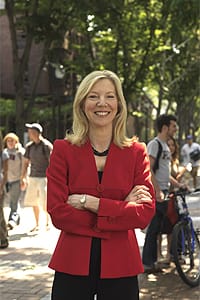Alumni who spent their Saturday morning in attendance at Penn President Amy Gutmann’s state of the University address were treated to something as sunny as the mid-May weather outside: her vision for Penn.
“The night we opened Penn Park … the sun was going in and out with the rain, and a double rainbow came out over Penn Park. So that’s our University: The sun shines on it today, and when it doesn’t shine, double rainbows come out,” she said.
Emphasizing Penn’s highest priorities—increasing access, integrating knowledge, and engaging globally and locally—Gutmann highlighted changes at the University during her tenure. Gutmann—who recently confirmed that she will stay with the University until 2019—joined Penn in 2004. Since then, applications for undergraduate admission to the University have increased 66 percent, resulting in a decreased admission rate: from one in five to one in eight. While prospective students may worry about high admission standards, parents do not have to worry about large tuition bills. The University has been able to keep tuition low for all students; it has increased by only 4 percent since 2004.
“For every student whose family has demonstrated financial, we cover the full need, and we now cover it without any loans, with all grants,” Gutmann said.

President Amy Gutmann
But keeping costs low for students and their families comes with a price tag: $181 million was spent on financial aid this year alone, an increase of 129 percent since 2004.
“Eighty percent of financial aid comes out of our operating budget, 20 percent out of gifts. We need to move that number up so we can do everything else that makes our alumni so proud,” she said.
What makes alumni proud, in part, is the recognition of Penn’s outstanding faculty members. Penn faculty received several notable awards, including the National Medal of Science. In addition, the University boasts 14 Penn Integrates Knowledge (PIK) professors—renowned scholars who hold appointments at two Penn schools and collaborate across disciplines. Interdisciplinary programs help prepare Penn students to have an impact on the world.
The President lauded the Wharton School for its concentration in Social Impact and Responsibility, which is housed in the Department of Legal Studies and Business Ethics, and includes courses in health care, finance and management, among others. Programs like this enhance Penn’s widespread impact.


























